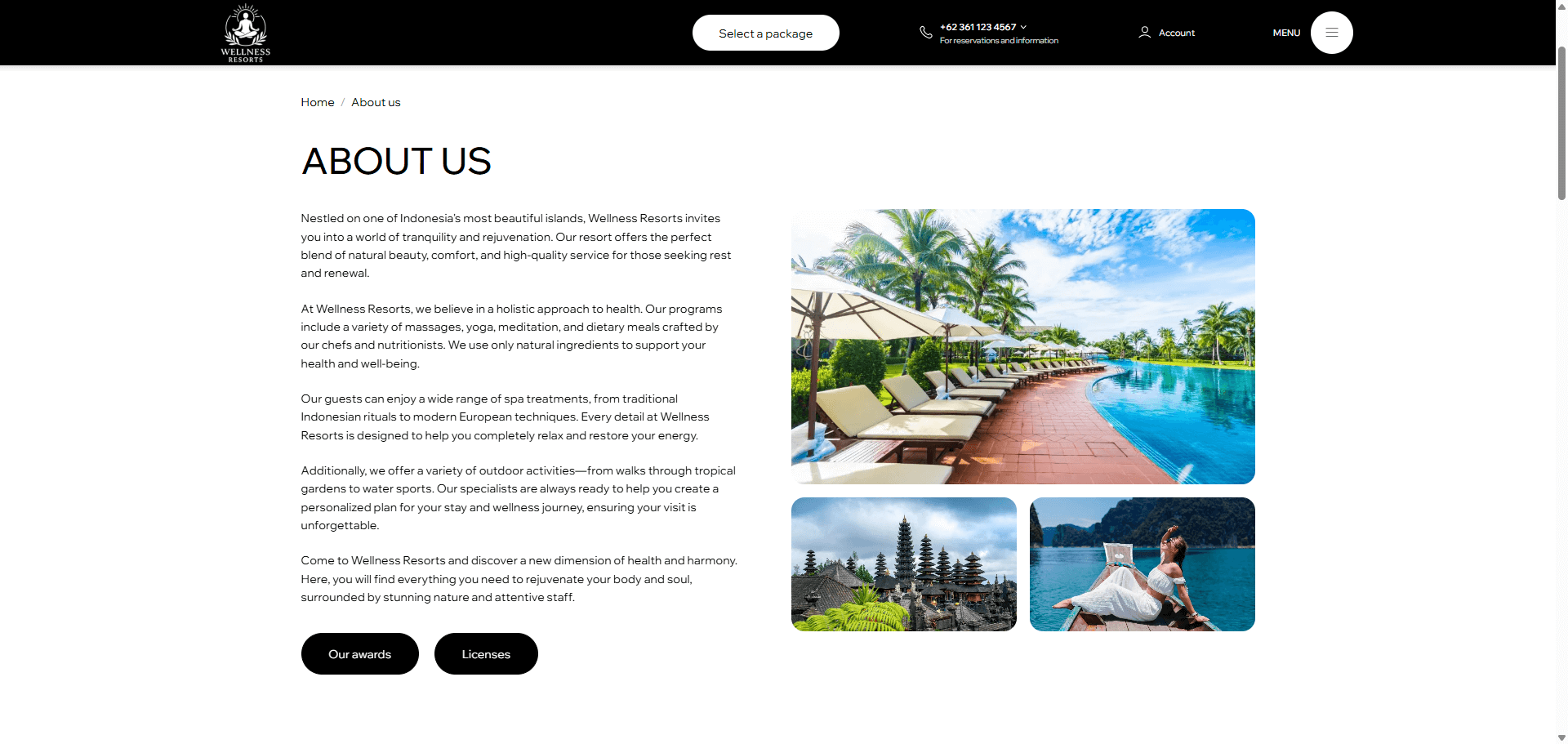How to Create an Effective “About Hotel” Page for AI Search Visibility
Why Updating Website Content Matters
AI systems and modern search engines prioritize freshness, relevance, and consistency. When your “About Hotel” page looks outdated — with old photos, amenities that are no longer available, or generic text — it sends weak signals about your credibility.
AI models don’t just take information from your website, they also gather data from reviews, OTAs, maps, and social media. If the page on your website is outdated or lacks detail, these models fill in the gaps with content from OTAs or other resources, which can push bookings away from your official website.
Keeping your content up to date brings real benefits:
-
It shows your hotel is live and reliable. This makes AI more likely to include your hotel in summaries, carousels, and recommendations.
-
It helps you connect with what guests want right now. Whether it’s family perks, wellness options, pet policies, or EV chargers, updating your info means you speak directly to today’s travelers.
-
It prevents confusion caused by outdated details. For example, listing a pool that’s closed can lead to unhappy guests and bad reviews.
-
It helps your website rank higher in search engines, strengthening internal links and increasing time spent on your site.
These are all part of effective hotel AI optimization that supports your overall marketing strategy.
Why Start with the “About Hotel” Page
The “About Hotel” page is one of the most popular pages on your website, and for good reason. It’s often one of the first places people and search engines look to understand who you are, where you’re located, and why your hotel is the right choice.
This page acts like a hub, bringing together your hotel's unique features and important facts in one place. That makes it easier for AI tools to recommend your hotel. Travelers also visit the “About Hotel” page to get a feel for your hotel’s reputation, location, and vibe before they decide to book.
Search engines pay close attention to pages like this, checking them more often than others. So when you update your “About Hotel” page, those changes get noticed quickly. By sharing your story along with key details like your address, amenities, and any awards you’ve earned, you create a page that works well for people, search engines, and AI.
Besides, the “About Hotel” page helps guide visitors and search bots to other important parts of your site, like your rooms, special offers, spa, dining options, and conference halls. It simplifies the search process for guests and increases your chances to get new bookings.
Must-Have Content for the “About Hotel” Page
Your “About Hotel” page is a critical spot to share what makes your hotel special and build trust with visitors. Below is a detailed table with important elements to include, what each should contain, and how they benefit AI and SEO, plus clear examples.
| Element | What to Include | AI/SEO Benefits | Example |
|---|---|---|---|
| Hotel Name | Full official name of your hotel | Ensures brand consistency and recognition | “Sunrise Boutique Hotel” |
| Hotel Overview | Brief description, history, style, and unique features | Helps AI understand your brand story and positioning | “Sunrise Boutique Hotel is a family-owned, eco-friendly hotel blending modern comfort with local charm.” |
| Location | Full address, neighborhood, nearby landmarks, transport options | Boosts local SEO and helps travelers find your location | “Located at 123 Main Street, Downtown, just 5 minutes from Central Station and the city park.” |
| Amenities | Key facilities like free Wi-Fi, parking, spa, pool, gym, and pet-friendly policies | Aligns with what guests are looking for and showcases your services | “Complimentary high-speed Wi-Fi, secure parking, a full-service spa, fitness center, and pet-friendly rooms.” |
| Awards & Reviews | Industry awards, guest ratings, notable testimonials or quotes | Builds credibility and trustworthiness for AI and users | “Rated 4.8 on TripAdvisor, winner of the 2023 Best Boutique Hotel Award.” |
| Visuals | High-quality photos or videos of rooms, lobby, surroundings, and amenities | Engages users and improves SEO with descriptive alt text | |
| Brand Values | Core values like sustainability or guest experience | Helps AI understand your hotel’s unique personality | “Committed to sustainability, we use solar energy and support local artisans.” |
| Navigation Links | Clear links to Rooms, Offers, Dining, Meetings, Booking pages | Improves site navigation for visitors and bots | |
| Contact Info | Phone number, email, social media links | Improves direct communication and local SEO | “Contact us at +123-456-7890 or follow us on Instagram @SunriseHotel.” |
By including these parts, your “About Hotel” page tells a complete, clear story that guests and AI both appreciate.
How to Create an AI‑Friendly “About Hotel” Description
Clear, concise, and well-structured content improves your chances of being recommended by AI and ranking higher in search results. Here are some practical tips to make your description work for everyone.
Use clear and simple language
Avoid technical jargon, industry buzzwords, or complicated phrases that might confuse readers or AI. Instead, choose everyday words and easy sentences that anyone can understand, whether they’re a first-time visitor or a search engine bot.
Clear language helps your message come across naturally and builds trust with potential guests. For example, instead of saying “Our establishment boasts a plethora of bespoke amenities,” say “We offer a range of special amenities to make your stay comfortable.”
Also, keep your sentences short and direct to improve readability and help AI parse your content without confusion.
Focus on facts, not opinions
When writing your “About Hotel” description, it’s important to stick to facts rather than opinions or vague claims. AI systems and search engines rely on clear, verifiable information to understand and rank your content. Statements like “We are the best hotel in the city” sound promotional but don’t provide specific details that AI or potential guests can check or use to compare.
Instead, focus on facts that highlight what makes your hotel unique and trustworthy. For example, mention your exact location (“Located 5 minutes from the train station”), your guest ratings (“Rated 4.7 stars by over 1,000 guests”), or any awards you’ve received (“Winner of the 2025 Hospitality Excellence Award”). These details give AI clear signals about your hotel’s quality and help search engines match your page with relevant search queries.
Use H1, H2, and H3 headings
Proper use of headings improves readability by giving your page a clear structure. It also helps search engines and AI assistants crawl your content more effectively. When they see organized headings, they better understand the hierarchy and importance of your information.
The H1 heading should be used for the main title of the page — usually your hotel’s name or a simple phrase like “About [Hotel Name].” This tells search engines and AI what the page is mainly about.
Use H2 headings for major sections such as “Location,” “Amenities,” or “Awards.” These break the page into clear parts, helping readers quickly find the information they want. H3 headings can be used to divide those sections further if needed, like listing specific amenities under the “Amenities” section.
Use structured data when possible
Structured data is a special kind of code you add to your website that helps search engines and AI systems understand the content on your pages more clearly. By using markup standards such as schema.org, you provide explicit information about your hotel, like its name, address, amenities, ratings, and more, in a format that search engines and AI can easily read and interpret.
Adding structured data to your “About Hotel” page increases your chances of appearing in featured snippets in search engine results. These enhanced listings often include extra details like star ratings, price ranges, or availability that makes your hotel stand out and attract more clicks.
Implementing structured data requires some technical setup, but many website platforms and content management systems offer plugins or built-in tools to simplify the process.
Use high-quality visuals with descriptive Alt text
Adding high-quality photos and videos to your “About Hotel” page brings your story to life. Visuals give visitors a real sense of your hotel’s atmosphere, style, and amenities — things that words alone can’t fully capture. Whether it’s cozy guest rooms, a sparkling pool, a welcoming lobby, or a scenic view, good images help create an emotional connection and make your hotel more memorable.
But visuals do more than just appeal to people. Search engines and AI also analyze images to understand your content better. That’s where descriptive Alt text comes in. Alt text is a short description of an image that tells AI what’s in the photo. Using clear, specific alt text not only improves accessibility for users with visual impairments but also helps search engines index your images accurately.
For example, instead of a vague alt text like “hotel photo,” use something like “Sunrise Boutique Hotel deluxe king room with city view.” This detailed description helps AI associate the image with relevant search queries and may improve your chances of appearing in image search results.
Conclusion
Your “About Hotel” page is one of the most important parts of your website because it helps both travelers and AI understand what makes your hotel special. Keeping this page clear, honest, and up to date with good photos and key details makes it easier for people to trust you and for AI to recommend your hotel. When you take the time to make your “About page” informative and easy to navigate, you also improve your chances of showing up higher in search results and getting more direct bookings.
Frequently Asked Questions (FAQ)
-
How does outdated content hurt AI visibility?
Outdated content can confuse both travelers and AI tools. If your page lists amenities you no longer offer, or it hasn’t been updated in years, AI might skip over your site and grab info from OTAs or review platforms instead, which means you can lose bookings. -
How should I structure the content for better AI readability?
Use clear, simple language and short sentences. Avoid marketing fluff and focus on facts. Organize content using proper headings (H1 for title, H2 for main sections, H3 for sub-sections) so that AI and search engines can easily understand the structure. -
Can guest reviews or testimonials help on the “About” page?
Yes — adding a few well-chosen guest testimonials (with permission) can increase trust and relevance. Use real quotes that speak to common guest concerns, like cleanliness, service, or convenience. -
How often should I update my “About Hotel” page?
Review and update it at least quarterly, or whenever there are changes to amenities, awards, policies, or branding. -
What type of tone or voice should I use?
Keep it friendly, professional, and informative. Write like you’re talking to a guest who just landed on your website and wants to know what your hotel is really like. Keep it honest, specific, and easy to read.

